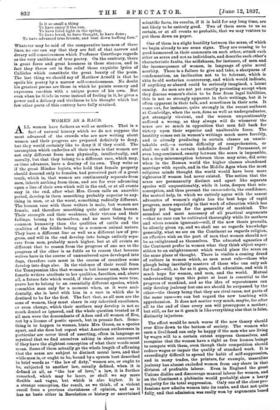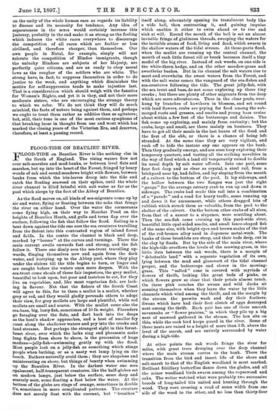WOMEN AS A RAUL A LL women have fathers as well
as mothers. That is a fact of natural history which we do not suppose the most advanced of the crowds who are now writing about women and their progress are prepared definitely to deny, but they would certainly like to deny it if they could. The assumption which underlies all their views is that women are not only different from men physically, intellectually, and morally, but that they belong to a different race, which may, as,time advances, have a destiny of its own. They write as if the great Hindoo legists, who hold that female property should descend only to females, had perceived part of a great truth, which is, that women are continuously separate from men, inherit nothing from them, and are for ever advancing upon a line of their own which will in the end, or at all events may in the end, after what Mrs. Green calls an anarchic period, develop in them something probably superior to any- thing in men, or at the worst, something radically different. The human race with these writers is male, but women are female, and therefore something quite other than human. Their strength and their weakness, their virtues and their failings, belong to themselves, and no more belong to a common humanity than the qualities of cattle and the qualities of the felidm belong to a common animal nature. They have a different line as well as a different law of pro- gress, and will in the end develop into beings entirely sepa- rate from men, probably much higher, but at all events so different that to reason from the progress of one sex to the progress of the other is as futile as to reason that because wolves have in the course of unnumbered ages developed into dogs, therefore cats must in the course of countless mons develop into dogs also. In the violence of their recoil from the Tennysonian idea that woman is but lesser man, the more fanatic writers attribute to her qualities, faculties, and, above all, a future fate which would, if their assumption were true, prove her to belong to an essentially different species, which resembles man only for a moment when, as it were acci- dentally, she is level with him in a race in which she is destined to be far the first. The fact that, as all men are the sons of women, they must share in any inherited excellence, or even change, which their mothers may develop is not so much denied as ignored, and the whole question treated as if all men were the descendants of Adam and all women of Eve, not by a license of poetic speech, but in prosaic fact. Some- thing is to happen to woman, hints Mrs. Green, as a species apart, and she does but repeat what American authoresses in particular are never tired of asserting, often in language so mystical that we find ourselves asking in sheer amazement if they have the slightest conception of what their words must mean. Some of them actually go the whole length of affirming that the sexes are subject to distinct moral laws, and that while man is, or ought to be, bound by a system best described in brief words as "the law of duty," women are, or ought to be, subjected to another law, usually defined, when it is defined at all, as "the law of love," a law, it is further remarked, which may be laxer, or shall we say more 'flexible and vague, but which is also higher. It is a strange conception, the result, as we think, of a violent recoil from a previous slavishness of opinion, and as it has no basis either in Revelation or history or ascertained scientific facts, its results, if it is held for any long time, are not likely to be entirely good. Two of them seem to us so certain, or at all events so probable, that we may venture to put them down on paper.
One of them is a slight hostility between the sexes, of which we begin already to see some signs. They are ceasing to be good-humoured in their comments on each other, attack each other as sexes and not as individuals, and describe each other's characteristic faults, the selfishness, for instance, of men and the inconsequence of women, in language of quite novel acerbity. There is a failure to give and take, a sharpness of condemnation, an inclination not to be tolerant, which is akin to old sectarian controversy, and which would indicate, if anything so absurd could be seriously imagined, a latent enmity. As men are not yet exactly protesting except when they discuss women's claim to be free from legal liabilities, this is not so strongly apparent in their writings, bat it is often apparent in their talk, and sometimes in their acts. It came out, for instance, quite strongly in the recent outburst at Cambridge, when the men, dons as well as undergraduates, got strangely virulent, and the women unquestionably suffered a wrong, as they always will do whenever the sexes are so much in opposition that men fall back for victory upon their superior and unalterable force. The hostility comes out in women's writings much more forcibly, and is already producing in certain classes an unmis- takable evil,—a certain difficulty of comprehension, or shall we call it a certain indefinite dread ? Permanent, or even long-continued, enmity between the sexes is impossible, but a deep misconception between them may arise, did arise when in the Roman world the higher classes abandoned marriage with equals, and in the Middle Ages when the most religious minds thought the world would have been more righteous if women had never existed. The notion that the sexes are permanently distinct and apart like separate species will unquestionably, while it lasts, deepen that mis-
conception, and thus prevent the camaraderie, the confidence,
the mutual help, in which we entirely agree with the sanest advocates of women's rights lies the beat hope of rapid progress, more especially in that work of education which has hardly yet begun for the generality of mankind. The soundest and most necessary of all practical arguments —that no race can be cultivated thoroughly while its mothers and wives remain ignorant—will, if the new thesis prevails, be silently given up, and we shall see as regards knowledge generally, what we see on the Continent as regards religion, an effective wish on the part of men that women should not be as enlightened as themselves. The educated agnostics of the Continent prefer in women what they think abject super- stition to an enlightenment which would place the sexes on the same plane of thought. There is visible a coming dread
of culture in women which, as men must rule—those who plough being inevitably masters of those who can only ask
for food—will, so far as it goes, check education, and with it much hope for women, and men, and the world. Mutual understanding upon this point at least is essential to the progress of mankind, and as the idea of separateness can only develop jealousy lest one sex should ,be surpassed by the other—the theory being that they are rival races, not parts of the same race—we can but regard the new teaching with apprehension. It does not matter very much, maybe, for after all to the end of time every son will presuppose a mother; but still, as far as it goes it is like everything else that is false, distinctly injurious.
The effect would be much worse if the new theory should ever filter down to the bottom of society. The women who earn a livelihood can only be happy if the men who are living by wages will to a certain extent suppress themselves, and recognise that the women have a right as free human beings to compete with them, even though their competition should reduce wages or impair the quality of standard work. It is exceedingly difficult to spread the habit of self-suppression, and in many trades, the printers, for example, masculine jealousy has almost excluded women from any share in that division of profitable labour. Even in England the great Unions dislike and discourage manual labour for women, and on the Continent a plebiscite would probably i show a heavy majority for its total suppression. Only one of the close pro- fessions now admits women into its ranks, and that not quite s,nd that admission was really won by arguments based on the unity of the whole human race as regards its liability to disease and its necessity for tendance. Any idea of separateness in the sexes would certainly increase this jealousy, probably in the end make it as strong as the feeling which induces the white races everywhere to discourage the competition of all races which are feebler or less civilised, and therefore cheaper, than themselves. Our own people in Natal, for example, simply will not tolerate the competition of Hindoo immigrants, though the unlucky Hindoos are subjects of her Majesty, are perfectly quiet citizens, and are as ready to obey moral laws as the rougher of the settlers who are white. The strong have, in fact, to suppress themselves in order to do justice to the weak, and anything which diminishes the motive for self-suppression tends to make injustice last. That is a consideration which should weigh with the fanatics for Women's Rights, and yet it is they, and not their more moderate sisters, who are encouraging the strange theory to which we refer. We do not think they will do much mischief, the facts of nature being against them, and perhaps we ought to treat them rather as oddities than as agitators; bat, still, their tone is one of the most curious symptoms of that breaking loose in thought from use and wont which has marked the closing years of the Victorian Era, and deserves, therefore, at least a passing record.



































 Previous page
Previous page